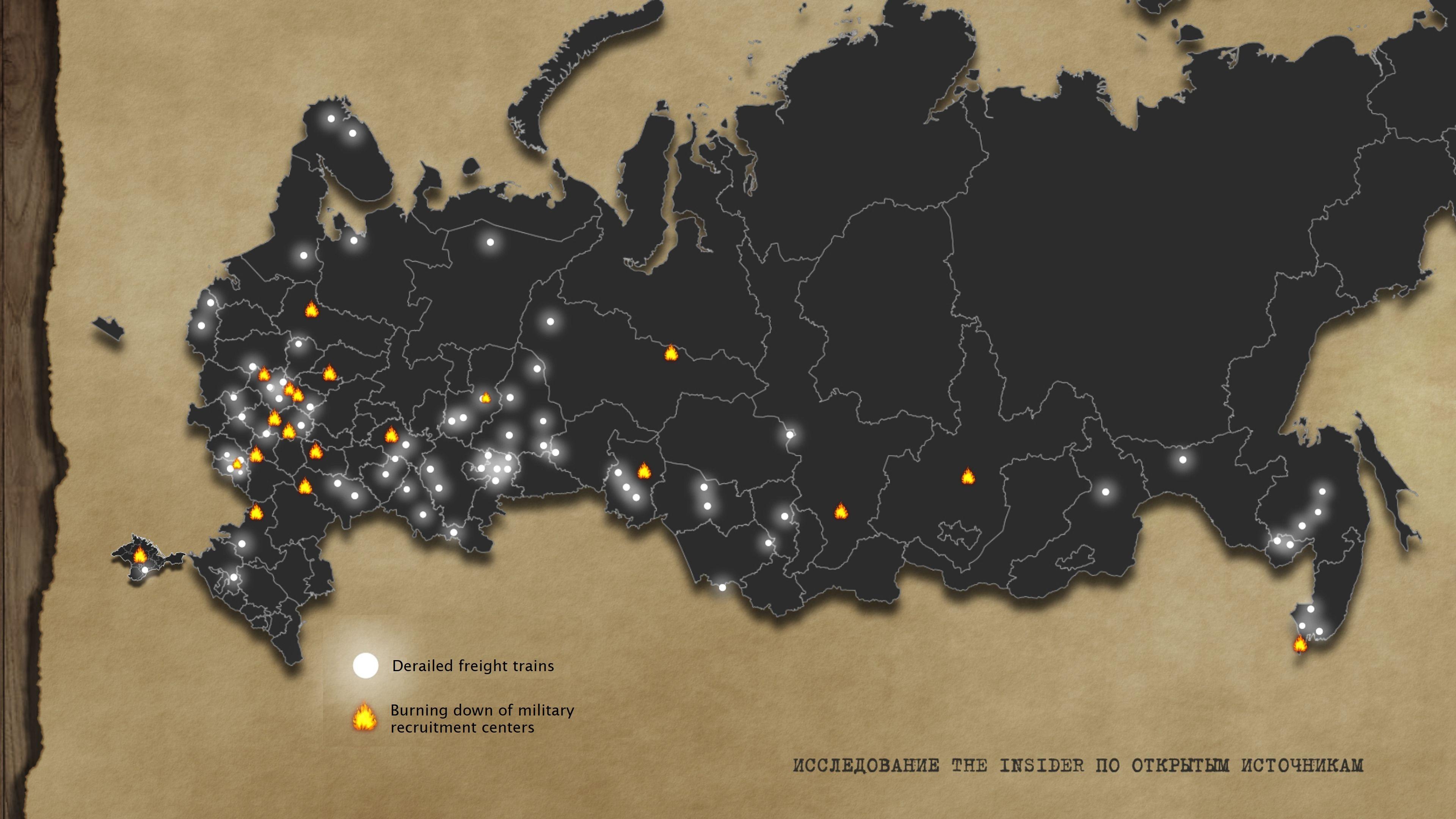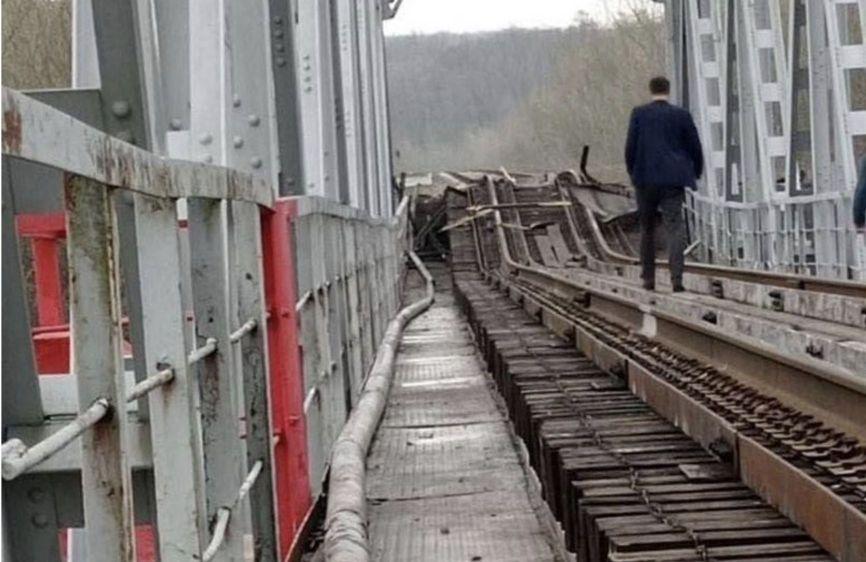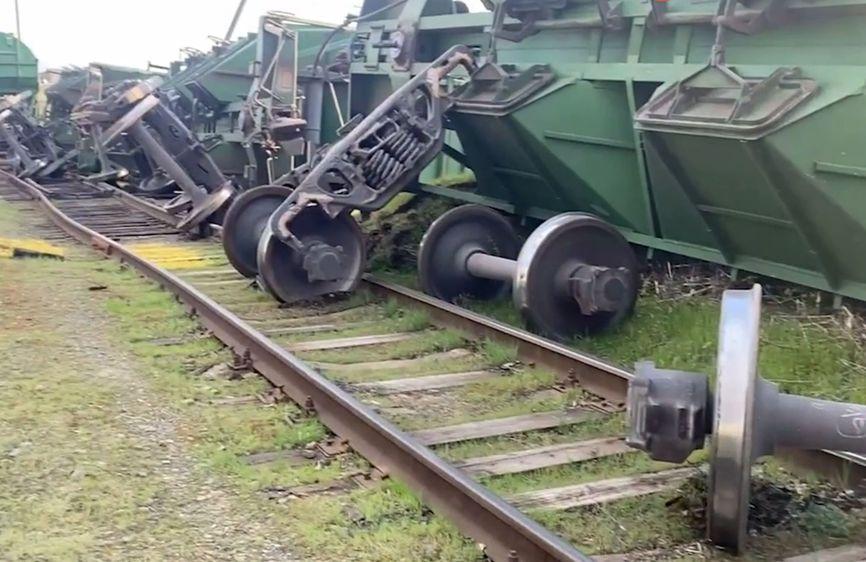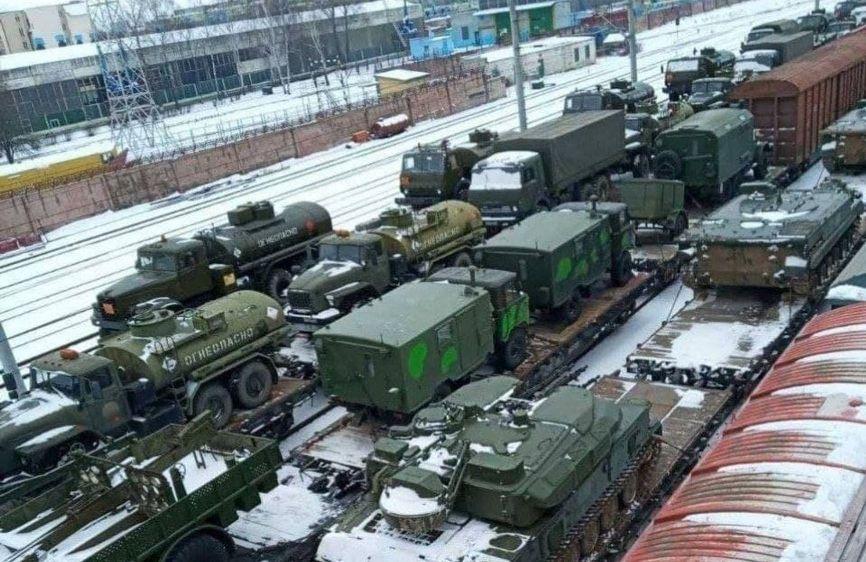How Russian partisans set fire to military registration, enlistment offices, derail trains
PHOTO/VIDEO
WORLD 07 July 2022 - 16:10
The Insider has published an article saying that the number of railroad accidents has increased sharply, and military enlistment offices are being set on fire all over Russia, after the start of a full-scale war with Ukraine. Caliber.Az reprints the article.
Underground groups opposed to the invasion of Ukraine have claimed responsibility for derailing railroad cars. They also put up videos of them throwing Molotov cocktails at military recruitment centres. The Insider spoke with some of those guerrilla groups to find out how the underground resistance is organized and why decentralization makes it especially effective.
Burning down military recruitment centres
Since the end of February, there have been at least 23 attacks on military registration and enlistment offices in Russia (the media and Telegram channels reported on those attacks), 20 of them arson attacks. Last year there were no similar incidents. Molotov cocktails were mostly used. Instructions on how to make those cocktails were distributed through social media.
These arsons were not part of a single coordinated campaign; various groups, from leftist anarchists and pro-Ukrainian activists to far-right groups, were behind them. Sometimes it was just loners who did not associate themselves with any movement. For example, Ilya Farber, a 48-year-old artist and former village teacher, was arrested in Udmurtia in late May for setting fire to two buildings of the military registration and enlistment office. «I wanted to find out what I was capable of. Am I ... capable of doing this,» he said describing his actions during the interrogation.
It was quite difficult for the authorities to keep quiet about the arsons, because the guerrillas themselves actively posted videos about them on social media. Here, for example, is a video of the arson of a military registration and enlistment office in Nizhnevartovsk:
And here's how the military registration and enlistment office in Lukhovitsy near Moscow was set on fire:
And this is the arson of the military registration and enlistment office in Perm:
But while it is impossible to hide the burning of military registration and enlistment offices, the other aspect of the guerrilla war - the rail war - can always be passed off as technical problems. That is exactly what the Russian authorities have been trying to do. But the official statistics show: the number of railway accidents has risen sharply since the beginning of the war.
Rail war
After the start of a full-scale war in Ukraine, news of sabotage on the railroad began to appear almost every day. On May 1, a bridge in the Kursk region designed for freight train traffic was destroyed in an act of sabotage.
According to the Insider, based on media reports alone, 63 freight trains derailed in Russia from March to June 2022. It is almost one and a half times as many as in the same period last year. The geography of wagon derailments shifted to the west, and some of the trains were involved in accidents near military units.

According to Russian Railways and inspecting authorities, most of the accidents were related to the poor condition of the railroad tracks.
«According to the Goszheldornadzor data for the 4 months of this year, 55.3% of the train wrecks were caused by irregularities in the current state of the track,» says partner.ru, the official publication of Russian Railways.
However, the authorities can't ignore the fact that some part of what happens on the railroads is sabotage. On February 24, the first day of the war, the Ministry of Transport ordered to increase the level of security on the railroads in the southern regions. In April, the Main Intelligence Directorate of Ukraine published a telegram in which the heads of certain railroad sections in the Rostov region and Krasnodar Krai were urged to cooperate with the FSB and the police to ensure security on railroad tracks.
However, all those measures have so far had little effect: accidents continue to occur, particularly in the border regions. For example, on April 12, residents of the village of Titovka in the Belgorod region on the border with Ukraine woke up to an explosion. Literally within an hour, Governor Gladkov tried to explain the situation. «In the Shebekino urban district, there was damage to the railroad tracks. There are no casualties or victims. Only the railroad track is destroyed. A task force is working at the site. I will report on the causes later.» But the governor of Belgorod has yet to offer an explanation. The photographs from the scene show the railroad tracks bent upward, rusty rails and part of the bridge collapsed.

On April 21, there was a new accident - a freight train derailed in the Belgorod region, near the Kreida station:

On April 27, the FSB reported the capture of two Russians who were allegedly preparing a new act of sabotage in the Belgorod region. According to the FSB, the detainees were »supporters of Ukrainian Nazism» and «transmitted information about Russia military servicemen» to the Ukrainian website Mirotvorets (Peacemaker). However, no names or identities of the saboteurs were released. The detainees' faces were blurred in the video published by RIA Novosti, they recited memorized phrases, and one of them was deliberately wearing a T-shirt with the British flag on it. According to official reports, they were charged with the preparation for an act of sabotage (Part 1, Article 30, and Part 1, Article 281 of the Russian Criminal Code). However, The Insider was unable to find any data on the arrests of people with such charges in the courts of the Belgorod region.
Roman Starovoit, governor of the Kursk region, spoke about the undermining of another railway bridge on May 1. He called the incident an «act of sabotage,» and the Investigative Committee opened a criminal investigation into the act of terrorism. And in late May the public chat »Beware, Moscow» posted a message that the FSB was looking for members of some «militant organization of anarcho-communists» which had been preparing an act of sabotage on railroad tracks in Sergiev Posad, Moscow region. According to the investigators, they unscrewed eight nuts, split a rail joint, and partially dislodged the tracks leading to military unit 14258 (a secret training and tactical centre of the 12th Main Directorate of the Ministry of Defense, which is responsible for the country's nuclear security).
The FSB failed to find the «militant anarchists.” But The Insider, on the other hand, did. Representatives of the Militant Organization of Anarcho-Communists (BOAK) reported that they had detained trains bound for another military unit, #55443 near Kirzhach (Vladimir Region) where the arsenal of the Main Missile and Artillery Directorate of the Russian Defense Ministry is located. «Unfortunately, the sabotage was discovered on the evening of June 25. Nevertheless, even in such a form, the act of sabotage harmed the enemy by delaying the movement of trains with military equipment and causing economic damage due to the need to rebuild the railroad tracks,» representatives of the cell told The Insider.

According to the anarchists themselves, their activities were largely inspired by the actions of the Belarusian partisans, who effectively resisted the Russian invasion through Belarus at the beginning of the war.
Background: Belarusian Partisans
When Russian troops first crossed the Belarusian border into Ukraine for what they thought would be a lightning attack on Kyiv, they intended to use the region's extensive railroad network for supplies and reinforcements. Their plans were thwarted by a network of Belarusian partisans who began attacking the railroad infrastructure. For example, they disrupted railway signalling control panels. As a result, trains stood idle for days, forcing the Russians to use trucks to resupply their troops. That in turn led to the famous 60-kilometre convoys north of Kyiv. To date, dozens of people have been detained in Belarus in the »rail guerrillas” case.
Attempts to damage the railroad and delay trains in Belarus began as early as 2021. After the authorities responded to the peaceful protests - rallies and leafleting - with mass arrests, torture, and long prison sentences, some protesters moved on to more drastic actions. This is how the informal movement «Supratsiou» was formed, which included the movement «Cyber Partisans» and «Busli Lyatsyats» - guerrilla cells «on the ground», which began to develop methods for decentralized attacks on the railway infrastructure.
However, all of these actions were also called «non-violent» by the participants of the movement, as their main goal was to interfere in the operation of the railroads and cause material damage. «We want to show Lukashenko's partners, including Russia, that he is unreliable, and to show the Belarusians themselves that the resistance continues,» a representative of the Belarusian guerrilla movement told The Insider.
By November 2021, the Belarusian government pronounced the movement as a terrorist. A few weeks later, guerrillas dropped a tank of an incendiary mixture from a drone on the Interior Ministry's Volovshchina training base. «We are engaged in anti-terrorism: we prevent the regime from terrorizing the civilian population. «Supratsiou» is preparing for the final counter-terrorist operation to eliminate the regime,» Busli stated.
A month before the start of the war (January 24), Supratsiouactivists carried out an attack on the Belarusian railroads, which had been prepared long ago: they encrypted most of the Belarusian Railways servers, databases and workstations and destroyed backups. «The goal was to slow down and disrupt railroad operations. Automatics and security systems were deliberately unaffected by the cyberattack to avoid emergencies,» the guerrillas said. At the same time the main idea was not only to slow down Russian military supplies: cyber guerrillas were ready to restore the servers in exchange for the release of 50 political prisoners most in need of medical care, and to stop the accumulation of Russian troops on Belarusian land.

Restoration of data systems turned out to be very difficult for Belarusian Railways. «The specialist who dealt with that type of databases had been fired last year for political reasons. The technology was old, and young specialists did not understand it,» said Sergei Voitekhovich, a railroad representative of the Worker’s Union.
Militant anarchists
In Russia, anarcho-communists have become the most active «subversive» force. As The Insider found out, a number of channels have appeared on Telegram since the beginning of the war, posting instructions on how to delay trains or cause accidents on the railroad. Their authors identified themselves as members of a certain «Militant Anarcho-Communist Organization.» Since March they have been publishing instructions on sabotage - how to dismantle railroad tracks and not get caught - and reporting on successful «operations.» Thus, the «anarcho-communists» took responsibility not only for dismantling and sabotaging railway tracks, but also for setting fire to cell phone towers (for example, in the village of Belomestnoye in the Belgorod region) and even for setting fire to the cars of the regime collaborators.
To coordinate and bring in new members, the anarchists have even launched a bot, that lets you anonymously join a cell in your city. The Insider emailed them a series of questions in an encrypted format, and also talked to one of the anonymous members, Ivan (name changed). Members of the organization claim that BOAK has been around for several years, but only announced itself publicly after the start of the war in Ukraine. They «picked up the idea from the Belarusian partisans».
«Rail sabotage is a relatively easy and very effective way to inflict damage on the enemy's army. And with minimal risk to civilians, if executed properly,» the anarcho-communists told The Insider.
According to them, any disruptions and delays in supplies and communications interfere with the workings of the military machine: «It means that at the decisive moment there will be fewer tanks or shells on the battlefield. And if we succeed in derailing a train, which is what we hope for, the equipment will not just be delayed, it will be damaged. Trains, railroad tracks, and so on will also be damaged. All this could seriously weaken the Russian armed forces and have an impact on how soon the war ends.»
The anarchists claim that have developed their own methods of preventing passenger train wrecks, so that civilians would not suffer from their actions.
The anarchist guerrilla movement is still decentralized. «There are both organized cells and spontaneous actions by people. Decentralization makes us more mobile and elusive, but it prevents media coverage and makes it difficult to estimate our numbers. After all, it’s better this way in the face of repression.
As of April, there were between 20 and 40 such cells in Russia, but now there are probably more,» says Ivan, a member of the movement. According to him, not all problems on the railroads make the news. Insignificant acts of sabotage - damage to signalling panels, traffic lights, coil wires - usually go unnoticed by the media. «Those actions only get reported by their perpetrators, but such reports are few. All actions that get into the press can be considered successful - no one covers unsuccessful ones, when nothing has happened,» Ivan says. The group is actively trying to raise funds through donations using their online resources.
According to the anarchists, no special training is required to participate in the rail war; all of the information is taken from the pamphlets distributed by the movement.
It's not only activists with a clear ideology who stage such actions. Yegor (name changed), a member of the cell that set fire to the car of Natalia Abieva, the founder of a fund to help the Russian military involved in the war with Ukraine, got in touch with The Insider. According to him, his comrades-in-arms primarily disagree with the actions of the authorities: «Among us, there are both anarchists and nationalists (but there are fewer of the latter). We each have our own story. We're an anti-system organization, and we will only be learning the intricacies of political management after the regime falls, or at least weakens. Putin has been stealing the future from Russia, and if we get bogged down in political disputes today, we won't exist tomorrow. Putin is threatening the world with nuclear war, turning the whole world against Russia, our compatriots are becoming even poorer, people are afraid to speak out loud about what they think of the government. To do nothing is to agree to live under the rule of vile creatures for the rest of our lives. Is this the future we want?»
Caliber.Az
|
1
|
Factory burst into flames in Germany PHOTO / VIDEO
03 May 2024 - 16:19
|
|
2
|
EU aid to Armenia stalled as Hungary pushes for Azerbaijan's inclusion Geopolitical tensions revealed
02 May 2024 - 17:41
|
|
3
|
Turning point for Georgia - Foreign Agents Law Georgian experts’ views for Caliber.Az
02 May 2024 - 12:40
|
|
4
|
Profiling Archbishop Bagrat Galstanyan – Tavush region protest leader
03 May 2024 - 17:20
|
|
5
|
The Azerbaijanis, not the Azeris, are hosting COP29 FDD article by Brenda Shaffer
02 May 2024 - 10:32
|
Armenian priests, peddling false narratives
Unmasking revanchist rhetoric05 May 2024 - 14:57
US official: Defence pact with Saudi Arabia impossible without Israel deal
05 May 2024 - 14:54
Bondholders to push Ukraine to resume debt payments
05 May 2024 - 14:36
Cuba abolishes visa regime for Chinese citizens
05 May 2024 - 14:17
S. Korea to participate in US-led cyber exercise this week
05 May 2024 - 13:58
French president favours continued dialogue with Russia amid tensions in Ukraine
05 May 2024 - 13:40
Three New York synagogues, Brooklyn Museum targeted in bomb threats
False alarm05 May 2024 - 13:21
Pro-Palestine rallies sweep across European cities amid Gaza onslaught
05 May 2024 - 13:02
Azerbaijan, Bangladesh discuss opportunities for cooperation in healthcare
PHOTO05 May 2024 - 12:44
Azerbaijan, Gambia cancel visa regime for diplomatic passport holders
PHOTO05 May 2024 - 12:27
France prepares for cyberattacks from Russia during Paris Olympic Games
05 May 2024 - 12:08
High time to declare US ambassador persona non grata
Mr. Libby, take your suitcase and leave for Washington05 May 2024 - 12:06
Hamas reveals plans for negotiations with Israel
05 May 2024 - 11:49
Azerbaijan, Morocco cancel visa regime
05 May 2024 - 11:32
Double standards and Michel's confession
Europe's hypocrisy05 May 2024 - 11:18
Russian troops take control of Ukraine's largest fortification in Krasnohorivka
05 May 2024 - 11:16
Azerbaijan, Somalia discuss issues of mutual cooperation
PHOTO05 May 2024 - 10:55
Georgia interested in cooperation on Green Corridor project, PM says
05 May 2024 - 10:39
Armenians protesting against delimitation of border with Azerbaijan reach Ijevan town
05 May 2024 - 10:18
World-renowned photojournalist plans to publish new books on his Karabakh journey
05 May 2024 - 10:01
Azerbaijani minister: Zangezur corridor to be beneficial for all countries in South Caucasus
05 May 2024 - 09:46
Azerbaijan to host 16th OIC Islamic Summit
05 May 2024 - 09:30
OIC urges Armenia to fulfill its commitments
05 May 2024 - 09:08
Bird flu outbreak in US cattle sparks fears over next global health crisis
05 May 2024 - 08:50
Senior UN official says northern Gaza is now in “full-blown famine”
05 May 2024 - 06:30
F-16 outclasses MiG-29 RAC in agility
05 May 2024 - 04:25
SEC shuts down Trump Media auditor over "massive fraud"
05 May 2024 - 02:20
Russia moved Karakurt-class warship to Caspian via inland waterways
05 May 2024 - 00:15
Denmark increases defense spending in view of Russian long-term war
04 May 2024 - 22:10
Boeing to send first astronaut crew to space after years of delay
04 May 2024 - 20:00
Kazakhstan extends ban on export of liquefied gas
04 May 2024 - 18:22
Skeletons missing hands and feet found in Hitler's Wolf's Lair
04 May 2024 - 18:12
Sudan on brink of "world's largest hunger crisis" — UN
04 May 2024 - 18:00
Azerbaijani, Turkish top diplomats hold meeting at OIC Summit
04 May 2024 - 17:49
Russia puts Ukrainian president on wanted list
04 May 2024 - 17:47
Netanyahu's vision for Gaza 2035 revealed online
From crisis to prosperity04 May 2024 - 17:32
Finalization of COP29 chairmanship agenda underway
Azerbaijani official says04 May 2024 - 17:17
Several arrested in connection with terrorist attacks in Iran
04 May 2024 - 17:02
Azerbaijan’s foreign ministry marks anniversary of cooperation with NATO
04 May 2024 - 16:47
US fund pledges aid to Azerbaijan in mine threat mitigation
PHOTO04 May 2024 - 16:32
